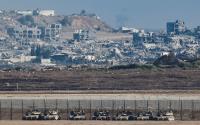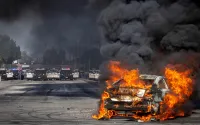9 November 2005Milan Rai interviewed by UK Watch
The following is an exclusive interview with long-time activist and writer Milan Rai. Milan is the author of 'War Plan Iraq' and 'Regime Unchanged' and a leading member of Justice Not Vengeance (http://www.j-n-v.org). He is an advisor to UKWatch and a contributor to the UKWatch blog.
UKWatch: The situation in Iraq appears to deteriorate by the day. The USAF have been carrying out bombing raids on Iraqi cities, and insurgent attacks occur just about everywhere outside of Anglo/American bases. Robert Fisk recently commented that Iraq is the most dangerous conflict there has ever been for journalists to cover. Some commentators argue that the "coalition" has already lost the war and that it is now a question of when the British and Americans withdraw rather than if. What is your reading of the current situation?
Milan Rai: I don't believe that the US/UK have already lost the war. They may well lose the war, and be driven out by the scale of violence and chaos, but we are some way away from that right now.
As various people have pointed out, success for insurgencies mostly consists of not being defeated and crushed. By that score the many-stranded insurgency is currently successful. It doesn't follow that it will continue to be successful, or that the occupation forces are being 'defeated'.
What seems to be happening is that the actions of the occupation forces, and in particular the reckless pre-emptive violence of the US troops (under orders to eliminate any potential threat to their personal security), are steadily increasing the level of hatred and violence. At the same time there is growing sectarian and inter-ethnic violence, partly as a result of the policies of the occupation (using Kurdish guerrillas to assault Sunni cities like Fallujah, for example), and a very very high level of violent crime (which the occupation forces are unable to control).
The current human, political and economic cost to the United States and Britain of the occupation is just about sustainable for the foreseeable future. So (ignoring possible pressure for change at home) we have three possible futures: go on like this for the next few years; a sharp rise in violence forcing the occupation forces out; or a decisive blow to the insurgency leading to a sharp reduction in violence, and a dramatic reduction in US/UK forces (what some people call an 'exit strategy' and what Donald Rumsfeld and Condoleeza Rice call a 'victory strategy').
What's most likely out of those three options? At the moment, probably option 1: go on like this for the foreseeable future, with some political gains for the Iraqi people, growing discord, and unremitting violence. Hell.
UKW: It is commonly argued by many press comentators that while the invasion may well have been wrong to withdraw troops now would be to subject the Iraqi population to the insurgents, who have certainly carried out many horrendous atrocities. What is your response? Should troops withdraw?
MR: Let's distinguish first between the various kinds of insurgents and the different kinds of 'foreign troops' who might be in Iraq.
Within the 'resistance', there is a division between the al-Qaeda element and the rest, and then divisions between other kinds of Islam-oriented militants, Ba'athists, non-Ba'athist nationalists, vendetta-pursuers, and so on. If all foreign forces were removed from Iraq, I think that there would almost certainly be an escalation in ordinary violent crime – which is checked to a certain degree by the occupation and collaborator forces - and a very serious risk of sectarian and ethnic violence on the scale of full-scale civil war.
There would also be an attempt by the al-Qaeda elements to take control of the country along the lines of the Taliban takeover of Afghanistan. Would that be successful? Probably not, but the attempt would heighten the level of chaos and violence.
Should troops withdraw?
Well, it is clear that US forces are part of the problem rather than part of the solution. British forces, by their direct and indirect support of US forces, because of their growing tendency to imitate the US approach, and through their own rather sordid record of abuse in southern Iraq, are also part of the problem rather than part of the solution.
Iraq has not got a chance of a decent, viable society without withdrawal of these forces.
On the other hand, Iraq may well need the presence of unbiased security forces, an international security presence in the country that is entirely free of US control.
My own feeling (following to a large extent the thinking of Iraq expert Juan Cole) is that the least damaging way forward for Iraq is the total withdrawal of US/UK forces in a staged manner over several months, and their simultaneous replacement by UN forces (perhaps drawn from the Islamic Conference countries, from the Arab world, or from the uncontaminated countries of the EU).
I stress that this is a replacement strategy. When the idea of UN forces is raised in mainstream discussion, it is generally in terms of a subordinate UN presence within a framework of continuing US control. This is a 'figleaf' strategy, and one that the UN, quite rightly, would not touch with a bargepole.
UKW: Media reporting focusses on the crimes of the insurgents and largely ignores the violence of the British and Americans – Medialens recently noted that the BBC devoted just nine seconds of coverage to the American bombing of Ramadi where, according to Iraqi sources, many civilians were killed. How do you view the current media coverage and is its depiction of the insurgents as by far the most dangerous force in Iraq accurate?
MR: Media coverage of violence in Iraq is appalling, partly for the understandable reason that most journalists are terrified of doing the things that are necessary to really cover the story, but mostly because of ideological conformity.
The depiction of insurgents as by far the most dangerous force in Iraq? Well, both Iraq Body Count and the Lancet Study published a year ago found that many more Iraqis were/are losing their lives because of military action by the occupation forces than because of military action by insurgents.
Then there is the huge toll of indirect deaths through, for example, the greater rate of fatal traffic accidents due to the high speeds and recklessness needed to avoid ambushes, hold-ups and curfew violations. These deaths are attributable to the ongoing occupation.
UKW: Some on the left have argued that the Iraqi insurgents deserve our support since they are fighting an illegal and very brutal occupation. What is your view?
MR: There is a right of resistance, whenever a country is occupied. This does not mean that every tactic is permitted, or that every vision of liberation is justifiable, or that every 'resistance' group is legitimate. In fact, many of the active groups are a serious problem for the Iraqi people.
I do not accept, in fact I vehemently reject, the slogan 'support the resistance' – unconditionally.
Secondly, what does it benefit anyone fighting in Iraq if someone here in comfort and safety says, 'I support the resistance' or 'We all should support the resistance'? If someone truly supports the resistance, they would be involved in directly assisting the resistance, or going to Iraq to fight. I find it distasteful to see, particularly, white people living in comfort urging brown people living in terrible danger to fight and die in the cause of 'anti-imperialism'. If you really believe killing British and US soldiers is the way forward, then go and take the risks yourself, and do not rely on others to win your war for you.
Thirdly, when someone living here and associated with the anti-war movement says 'I support the resistance', they do nothing to assist 'the resistance', but they do much to harm the cause of the anti-war movement and thus the cause of the Iraqi people, as people who might otherwise listen to us are less willing to listen to the arguments for withdrawal.
UKW: Some anti-war activists and commentators have criticised the Stop the War Coalition for being undemocratic, overly centralised and for not helping to mobilise for direct action. Do you think this criticism is justified and what do you think the anti-war movement should be focussed upon now?
MR: One can either criticise existing organisations, or one can try to improve them from within, or one can set up complementary/alternative organisations. The Stop The War Coalition has many achievements to its credit, and has also limited the movement in a number of ways. Those who are dissatisfied with it often accord it more power than it actually has or should possess.
What should the anti-war movement be focussed on right now? Unlocking the majority opposition to the occupation, and turning the rather tentative and lukewarm discomfort people feel about the war into a powerful and angry force for change. I've got some ideas about how to do that, but I'll be writing about that at greater length in the next few weeks.
UKW: There is much speculation that the United States is gearing up for an assault on Iran. Given how disastrous the occupation of Iraq has been and how deeply unpopular attacking Iran would be, (even Jack Straw has ruled out British support for such a move), how likely do you think it is that such an attack would happen?
MR: I think it is extremely unlikely that there will be an invasion of Iran in the foreseeable future. Iran is big and its military is capable, unlike the poor state of sanctions Iraq. The US has learned from the Iraqi invasion of Iran two and a half decades ago.
Might the US launch airstrikes and so on? Possibly.
The most likely scenario, in my view, is another Orange Revolution-type situation, where the US appears to be backing youth, freedom, democracy, pop music, and other Good Things, as it tries to shake the establishment and secure the rule of thugs who will take orders from Washington.
UKW: Some might argue that since the British presence in Iraq is so small our withdrawal would have little or no impact. What would be the impact of a unilateral British withdrawal?
MR: Why was the US so desperate to have us in the invasion force? We were militarily insignificant in the original invasion plan, but politically we were critical to securing domestic acquiescence in the war – Blair's on board, we have the backing of 'the international community'. Just so with the occupation. British withdrawal would set the alarm bells ringing in Washington and across the country.
British withdrawal would help build pressure that might modify and restrain the US occupation forces. It would help to deter future wars.
British withdrawal is crucial for the Iraqi people and for others under threat around the world.
UKW: What are the Americans aiming for? What will they now settle for in Iraq?
MR: Control. Residual US forces hunkered down in bases, tame Iraqi political institutions, obedient (often Saddam-era) military-intelligence-police-judicial formations that will enable US control of the country.
UKW: You have written much recently on the governments response to the London bombings. How serious is the threat to human rights in this country? What should concerned people do about that threat?
MR: The threat is very serious. The threat to freedom of expression is coming from many different directions, without much response. As freedom and human rights are eroded, alienation, fear and hatred increases, and national security is eroded. Doing the right thing is also doing the safe thing.
What can we do? Everything we normally do to resist bad policies. Everything from education and lobbying to nonviolent civil disobedience.
http://www.zmag.org/content/showarticle.cfm?SectionID=15&ItemID=9079






